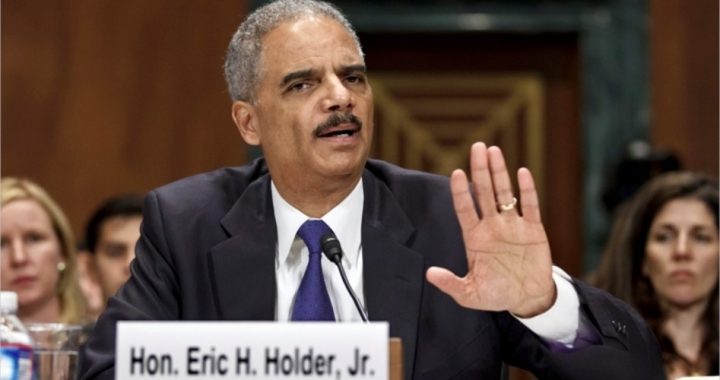
Late last week, U.S. Attorney General Eric Holder appointed two U.S. attorneys to investigate the alleged “leaks” of classified information many suspect originated in the White House. The attorneys will conduct a separate but concurrent investigation with the one presently being pursued by the FBI. After “doggedly” following the facts, the attorneys are authorized to “prosecute criminal violations discovered as a result of their investigations and matters related to those violations, consult with members of the Intelligence Community and follow all appropriate investigative leads within the Executive and Legislative branches of government.”
The information allegedly “leaked” was first published in the New York Times and provided specific descriptions of several operations initiated by President Obama in the “war on terror.” Among the revelations included in the piece by David Sanger were details of drone strikes and the deployment of the Stuxnet virus, the computer attack aimed at Iran’s nuclear infrastructure.
Given the President’s obvious pride in his remote-control killing program and the apparent success of the cyber-attack on Iran, there is rampant speculation that the information that was given to the New York Times was less a leak and more an example of the White House blowing its own horn.
Some stories related to the leaks report that it would have been impossible for information so classified and so detailed to have been obtained without either the knowledge or the cooperation of the Obama administration.
“…it’s impossible to imagine that Sanger could have gathered the level of detail that he did about the classified program if the White House didn’t want at least some of the information to reach the public.”
Naturally, a spokesman for the White House rejected this assertion saying, “I am telling you that this administration — well, that it’s our view, as it is the view of everybody who handles classified information, that information is classified for a reason; that it is kept secret, it is intended not to be publicized because publicizing it would pose a threat to our national security.”
President Obama spoke similarly last Friday when confronted at a press conference with the idea that he or someone in his administration was purposely providing classified information to reporters in order to highlight “successes” in his foreign policy. Said the President:
The notion that my White House would purposely release classified national security information is offensive. It is wrong, and people, I think, need to have a better sense of how I approach this office and how the people around me here approach this office.
We are dealing with issues that can touch on the safety and security of the American people, our families, or our military personnel or our allies. And so we don’t play with that.
It is probably wise for the President to take every opportunity to distance himself from the controversy, as there are some in Congress who have already called for a more thorough investigation into the source and for the imprisonment of whoever is found guilty of having handed over such sensitive material.
Representative Mike Rogers (R-Mich.) is the chairman of the House Intelligence Committee and he told reporters that the person who leaked the information has “committed a crime that is having serious consequences to our national security.”
Arizona Senator John McCain sees a more immediate, electoral motivation for the alleged leaks:
“These leaks clearly were not done in the interest of national security or to reveal corrupt or illegal actions about which the public has a right to know, as in the case of legitimate whistleblowers,” McCain said. “It is difficult to escape the conclusion that these recent leaks of highly classified information, all of which have the effect of making the president look strong and decisive on national security in the middle of his re-election campaign, have a deeper political motivation.”
All the cries of “lo, here” and “lo, there” are really just sound and fury signifying nothing. The real story is that the accuracy of the content of the Times’ story is irrefutable and the value of it makes the provenance of necessity somewhere high up in the Obama administration.
For example, the story of the intentional infection of Iran’s computer with the Stuxnet virus is particularly interesting given the parameters of the operation, as well as the import such an act of computer sabotage on another nation would have on the credibility of the United States. Just last year, the Pentagon and the White House warned that any attempt to violate the computer security of the United States would be considered an “act of war.”
Are we, then, at war with Iran? Is what would be an act of war if perpetrated by another nation simply a clever tactic when deployed by the United States? It would seem so.
This is not the only apparent contradiction in the current President’s political philosophy. Despite all the finger wagging, promises of “serious investigations,” and sounding of national security alarms, there is nothing of any measurable substance in the White House’s efforts to locate the leak. This contrasts distinctly with the President’s pursuit and prosecution of those who have revealed information that casts him and the government of the United States in an unfavorable light.
Take the deplorable treatment of Thomas Drake. Drake was a senior executive at the National Security Agency who made the mistake of revealing to the Baltimore Sun that the NSA’s Trailblazer Project, a project intended to analyze data carried on in the United States and elsewhere through the Internet, cell phones, and emails, not only violated the Fourth Amendment’s proscription against unwarranted searches and seizures, but it was a “billion-dollar computer boondoggle.”
In April 2010, Drake was indicted by a federal grand jury of several crimes, including violation of the Espionage Act. If convicted of the charges against him, Drake faced up to 35 years in federal prison.
Early in the summer of 2011, after several exposés ran in newspapers and on television, the Obama administration dropped all of the charges against Drake in return for Drake’s guilty plea to a misdemeanor of misusing NSA computers. Drake was sentenced to one year of probation and community service.
And there is the equally indefensible treatment of Army Private Bradley Manning who is currently being court-martialed for allegedly passing classified data while deployed in Afghanistan.
In what is described as “the biggest leak of classified information in U.S. history,” Manning is accused of passing over 700,000 documents and video clips to WikiLeaks, the widely known website devoted to exposing government corruption throughout the world.
If convicted of the charge of giving aid to the enemy, Manning could face life imprisonment. The maximum penalty for the other charges he faces is 150 years combined.
Imagine for a moment that Attorney General Holder’s investigators were truly granted unlimited authority to prosecute anyone found complicit in the leaks to the New York Times. Imagine further that this person was irrefutably identified as President Barack Obama. Would he demand the due process that he has denied to so many?
Photo: Attorney General Eric Holder testifies in Washington, June 12, 2012, before the Senate Judiciary Committee hearing looking into national security leaks: AP Images



